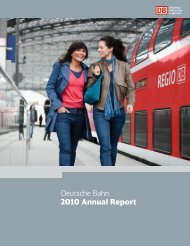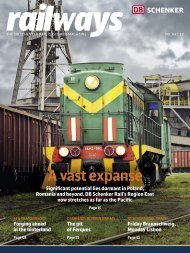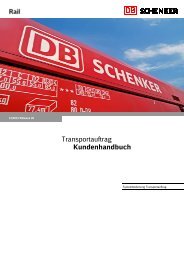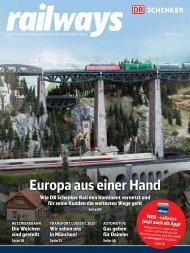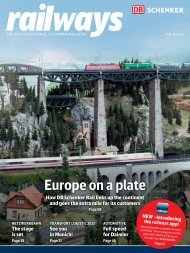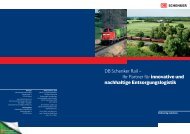PDF Download
PDF Download
PDF Download
Create successful ePaper yourself
Turn your PDF publications into a flip-book with our unique Google optimized e-Paper software.
Railway network: 15,814 kilometres<br />
Photo: Ken Marshall/Fotolia<br />
a high standard of service at low prices, which is why we are<br />
repeatedly successful in winning new and important contracts.”<br />
The corporate structure is geared specifically to the customers,<br />
one of the keys to the company‘s success. The “Industrial” business<br />
segment looks after customers from the energy sector and<br />
industry, “Construction” works for companies from the construction<br />
and infrastructure sectors, and “Logistics” provides terminals<br />
and logistics services. “This organisation ensures that our customer<br />
support agents are not only thoroughly familiar with all rail<br />
freight issues, but are also experts in the different industrial sectors<br />
of their own customers,” states Thauvette. “We know the<br />
specific requirements of our clients and can consequently draw<br />
up tailor-made offers that meet the long-term requirements of<br />
our customers.”<br />
New markets<br />
According to the annual statistics of the Office for Rail Regulation<br />
(ORR), the transport volume in the British rail freight market<br />
fell by 2.6 per cent in fiscal year 2008/2009 compared to the previous<br />
year. The figures for 2009/2010 are not yet available, but<br />
the global recession will obviously have led to further reductions<br />
in the figures for some areas, especially for steel and coal. DB Schenker<br />
Rail has taken appropriate steps and adjusted capacities to the<br />
decline in demand.<br />
It has also launched several programmes to compensate for the<br />
drop in sales resulting from the economic downturn.<br />
One of these was the “Challenge Us!” campaign. “We asked<br />
companies to state the conditions under which they would be<br />
prepared to switch road transports over to rail,” says Thauvette.<br />
“The campaign has been a total success and we have won several<br />
new contracts, especially in the intermodal sector.”<br />
Despite the present economic slump, the British government<br />
aims to double the volume of rail freight transport by the year<br />
2020. DB Schenker Rail (UK) is making every effort to ensure that<br />
it will benefit from that trend. This meant developing new markets<br />
and promoting innovation. Thauvette provides a current example:<br />
“Last autumn, our engineers converted a coal wagon to create<br />
the first multi-user wagon for biomass in the UK. This will allow<br />
us to enter into a completely new market segment.” (see Railways<br />
2/2010). Another innovative product which will attract new customers<br />
is the transport of fresh produce from Spain to England<br />
(see article in this issue), which has made Spanish fruit and vegetable<br />
producers and British importers independent of short-term<br />
expensive transport services.<br />
“The United Kingdom is a major rail freight market and is closely<br />
networked with the other European markets,” says Thauvette.<br />
“We are determined to make continuous improvements to our<br />
range of services and to strengthen and expand our position in the<br />
European network of DB Schenker Rail.”<br />
Contact | Alain Thauvette<br />
Phone: +44 (0)870 140-7071 | alain.thauvette@dbschenker.com<br />
RAILWAYS | 27



